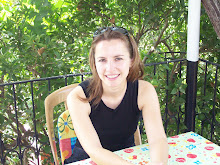+cropped.jpg)
Let me preface this by saying I will follow with a post on beauty. But since it has taken me a few years to get over my culture shock (read: the "everything's better in Canada mentality") and see the beauty here, I'll introduce you to this subject as I experienced it, namely ugliness before beauty.
Turkey is famous for its beautiful mosques and Ottoman architecture; its colourful tiles and intricate copper work. But the reality is that there is unfortunately a lot of ugliness too; ugliness made all the more so by the hot, dustiness in Adana. A former industrial city, the wealthy business owners have mostly left, and migrants from the surrounding rural areas have moved in, giving Adana the nickname of city-sized village.
An overview of the visual landscape:
- a prevalence of concrete
- the use of brightly coloured paint to soften said concrete
- flat roofs littered with solar panels and hot water tanks
- satellite dishes and air conditioning units visible on all vertical surfaces
- uneven sidewalks and storefronts
- litter
- little greenery; lots of exposed dirt and dust
.jpg)
I understand that economics is a factor, but I am not criticizing poverty. Often, it is the places where the most money is spent that are the most offending. For Adana is in many ways booming, and construction is taking place everywhere -- most of it to house the growing middle-class population. Luxury apartments and villas have also appeared in the three years I've been here.
But even if the building is more than just a painted concrete block and promises to provide a bit of beauty, just as it is receiving its finishing touches, up go the water tanks and the air conditioning units. Inside, wall tiles are often laid crookedly and stained by dripped paint; wood trim and parquet flooring also have paint on them; and electrical outlets 'float' in the middle of walls, having been placed several feet off the ground beside light switches; and for mysterious reasons, crown mouldings hang from the ceiling six inches in front of windows, allowing curtains to be mounted on a track on the ceiling behind.

For me, it is the collision of modernity with a simpler way of life, where modern trimmings and appliances are used by those who have far more important concerns than aesthetics. I'd far rather see an old wooden window frame with hand-sewn curtains, than sloppily executed attempts at elegance and luxury.
+cropped.jpg)
.jpg) I understand that economics is a factor, but I am not criticizing poverty. Often, it is the places where the most money is spent that are the most offending. For Adana is in many ways booming, and construction is taking place everywhere -- most of it to house the growing middle-class population. Luxury apartments and villas have also appeared in the three years I've been here.
I understand that economics is a factor, but I am not criticizing poverty. Often, it is the places where the most money is spent that are the most offending. For Adana is in many ways booming, and construction is taking place everywhere -- most of it to house the growing middle-class population. Luxury apartments and villas have also appeared in the three years I've been here.







![Reblog this post [with Zemanta]](http://img.zemanta.com/reblog_e.png?x-id=86a9f634-04fc-48cf-a96e-c02c29f12fc1)






![Reblog this post [with Zemanta]](http://img.zemanta.com/reblog_e.png?x-id=d4dbf8d2-39f7-43a5-b6de-bb15de180ec2)




